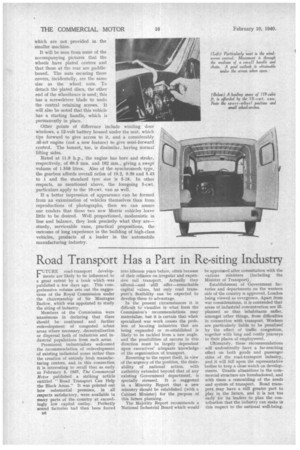Road Transport Has a Part in Re-siting Industry
Page 32

If you've noticed an error in this article please click here to report it so we can fix it.
FUTURE road-transport developments are likely to be influenced to a great extent by a book which was published a few days ago. This comprehensive volume sets out the suggestions of the Royal Commission under the chairmanship of Sir Montague Barlow, which was appointed to study the siting of industry.
Members of the Commission were unanimous in declaring that there should be continued and further redevelopment of congested urban areas where necessary, decentralization or dispersal both of industries and industrial populations from such areas.
Prominent industrialists welcomed the recommendation of redevelopment of existing indirstrial zones rather than the creation of entirely fresh manufacturing centres, and in this connection it is interesting to recall that as early as February 5, 1937, The Commercial Motor published a striking article entitled "Road Transport Can Help the Black Areas." It was pointed out how substantial premises, in all respects satisfactory, were available in many parts of the country at exceedingly low capital outlay. Perfectly sound factories had then been forced
B6 into idleness years before, often because of their reliance on irregular and expensive rail transport. Actually they offered—and still offer—remarkable capital values, but only road transport's flexibility can be expected to develop these to advantage.
In the present circumstances it is difficult to visualize in what form the Commission's recommendations may materialize, but it is certain that when specialized war work ceases the problem of locating industries that are being expanded or re-established is likely to be tackled from a new angle, and the possibilities of success in this direction must be largely dependent upon executives' adequate knowledge of the organization of transport.
Reverting to the report itself, in view of the urgency of the position, the desirability of national action, with authority extended beyond that of any existing Government department, is specially stressed. It is suggested in a Minority Report that a new ministry should be established (with a Cabinet Minister) for the purpose of this future planning.
The Majority Report recommends a National Industrial Board which would be appointed after consultation with the various ministers (including the Minister of Transport).
Establishment of Government factories and departments on the western side of the country is approved, London being viewed as overgrown. Apart from war considerations, it is contended that areas of industrial concentration are illplanned so that inhabitants suffer, amongst other things, from difficulties in connection with transport. Workers are particularly liable to be penalized by the effect of traffic congestion, together with long and costly journeys to their places of employment.
Ultimately, these recommendations will undoubtedly have a far-reaching effect on both goods and passenger sides of the road-transport industry, and it will fall upon the representative bodies to keep a close watch on developments. Drastic alterations in the commercial structure are foreshadowed, and with them a remoulding of the needs and system of transport. Road transport may have a still greater part to play in, the future, and it is not too early for its leaders to plan the contribution that the industry can make in this respect to the national well-being.




























































